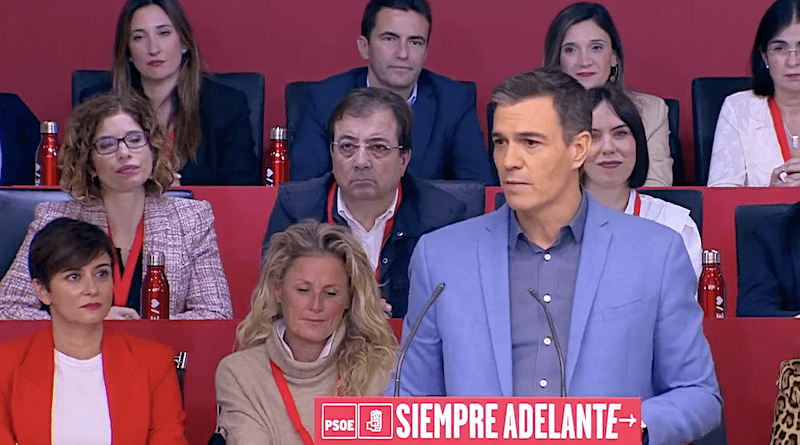Spain: Sánchez Says Pardoning Catalan Separatists Only Way For Socialists To Regain Power
By EurActiv
By Fernando Heller
(EurActiv) — Pardoning Catalan separatists is the only way for Spain’s acting Prime Minister Pedro Sánchez socialist PSOE party (S&D) to secure a majority to form a stable government, he insisted, indirectly admitting that passing an amnesty law for those involved in the 2017 secessionist attempt in Catalonia is key.
On Saturday, Sánchez addressed PSOE members in Madrid about his ongoing coalition talks with regional parties, including pro-independence groups from Catalonia and the Basque country.
“In the name of Spain, in the interest of Spain, in defence of coexistence among Spaniards, I defend today the amnesty in Catalonia for the events of the past decade (the region’s pro-independence movement),” the Socialist leader told PSOE´s Federal Committee.
“I fully understand those who, out of the pain of memories, feel torn, but it is our responsibility to take the step because we cannot allow the past to close the doors to the future”, he added.
Sánchez’s plan to form a coalition government with the parliamentary support of Catalan and Basque pro-independence forces is highly controversial and has drawn fierce criticism from both the Partido Popular (PP/EPP), the main opposition force in parliament, and the far-right VOX party, the third largest in the chamber.
On Sunday, around 100,000 VOX supporters demonstrated in Plaza de Colón, in Madrid’s city centre, against a possible amnesty law, which they described as Sánchez’s “coup d’état”.
PSOE’s decision to go ahead with the amnesty law was also lamented by PP leader Alberto Núñez Feijóo at a party rally in Málaga on Sunday, who called it a “bargaining chip” for the acting prime minister to stay in power.
“An amnesty does not pursue reconciliation but arises from reconciliation, which arises from the will to reconcile. There is no will if those (Catalan separatists) who broke the law say they will do it again”, Núñez Feijóo stated, EFE reported.
Sánchez’s potential amnesty for Catalan leaders who held an unsanctioned independence referendum in 2017 has sparked widespread controversy in Spain, but fierce criticism of the possible pardon has not only come from the right-wing camp.
Criticism also came from PSOE’s ‘old guard’ led by former prime minister Felipe González, and from some PSOE regional presidents, including Emiliano García-Page in Castilla-La Mancha, who publicly opposed a possible amnesty for those involved in the October 2017 secession attempt.
Former Catalan regional president and Together for Catalonia leader Carles Puigdemont (JxCAT) has said he will only consider backing the interim prime minister if charges against him and other separatist leaders of the Catalan independence movement, called “procés” (the process) by separatists, are dropped.
When King Felipe VI nominated Sánchez to form a government earlier this month, the latter called for “generosity”, “commitment”, “leadership”, and “policy” to solve the Catalonia issue and break the long political deadlock with the “Catalan conflict”, as pro-independence forces describe it.
The interim prime minister also defended the “difficult” decision he took in June 2021 when he pardoned nine separatist leaders who were convicted for declaring Catalonia’s “independence” in 2017, insisting that “it was right” and was taken for the sake of the country’s best interests.
This week, PSOE secured the support of the left-wing platform Sumar, a group of 15 progressive formations, including Unidas Podemos, led by the Deputy Prime Minister and acting Labour Minister Yolanda Diaz.
Sánchez wants ‘free hands’ to negotiate
The next few days will be decisive in Sánchez and Díaz’s ‘road map’ to form a government and avoid the country having to vote again in early elections, most probably in January 2024.
In recent days, optimistic messages have multiplied in both PSOE and Sumar about an imminent announcement of the agreement with Catalan and Basque separatists, not only for a new investiture but also for a full legislative agreement, which includes the approval of the country’s budget.
However, Sánchez, whose leadership is contested by many critical voices within his party, wants a so-called ‘free hand’ in the negotiation process.
To pave the way for the agreement, PSOE will submit the pact with Sumar and the strategic guidelines of the future accord with centre-right JxCat, Esquerra Republicana de Catalunya (Republican Left of Catalonia, ERC), and moderate pro-independence Basque Nationalist Party (PNV), among others, to a vote of its members.
The internal consultation will occur online from Monday to Friday and will be held in person only on Saturday, party sources confirmed.
On Saturday, PSOE´s Federal Committee approved the question to be put to its militants, which does not expressly mention a possible amnesty law.
“Do you back the agreement to form a government with Sumar and achieve the support of other political formations to reach the required majority?” the text of the question reads

